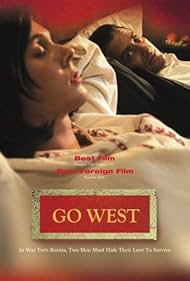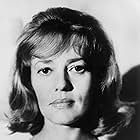In the 1990s the Yugoslavia Federation falls apart in bloody wars. Perpetual student Milan, a Serb from a patriarchal community, and Kenan, a Muslim cellist, are a homosexual couple living i... Read allIn the 1990s the Yugoslavia Federation falls apart in bloody wars. Perpetual student Milan, a Serb from a patriarchal community, and Kenan, a Muslim cellist, are a homosexual couple living in Sarajevo. Their lives, intimate and public, are shaken up by the aggression in Bosnia an... Read allIn the 1990s the Yugoslavia Federation falls apart in bloody wars. Perpetual student Milan, a Serb from a patriarchal community, and Kenan, a Muslim cellist, are a homosexual couple living in Sarajevo. Their lives, intimate and public, are shaken up by the aggression in Bosnia and Herzegovina, whose devastating consequences unfold in inter-ethnic hatred. Trapped in Sa... Read all
- Awards
- 3 nominations
Photos
- Posilna
- (as Orijana Kuncic)
- Anto
- (as Miso Mrvaljevic)
- Zena u vozu
- (as Vanesa Glodjo)
- Director
- Writers
- All cast & crew
- Production, box office & more at IMDbPro
Storyline
Horror and madness must come before absurdity of course, and there is definitely nothing to laugh at during the opening sequences, where the two protagonists carry on with their lives in Sarajevo before they are overwhelmed by the turmoil. Director Imamovic weaves genuine newsreel footage of the conflict into his specially-shot sequences of Serbian militia terrorising the locals and gunning down the Muslim population (with soldiers forcing men's pants down in search of tell-tale circumcisions). As Milan and Kenan's lives are quickly overturned, forcing them into flight, the audience is given a street-level snapshot of how the conflict might have been experienced firsthand.
Fuelled by such life-or-death desperation, I found myself wondering if indeed the real-life Muslim homosexuals might too have disguised themselves as married women in order to escape execution. As Kenan himself states at the beginning, "On the Balkans, it's easier to bear if someone in the family is a murderer rather than a faggot (sic)." Under pressure from all sides, much of the tension in 'Go West' therefore derives from we the audience wondering just how long he will be able to maintain his disguise while besieged by threats on all sides (some not necessarily malicious) to expose the truth. Actor Mario Drmac plays the would-be transvestite with great skill, giving Kenan a quiet strength, though portraying him on a knife-edge as the drama escalates. 'Go West' is ultimately his story, showing the lengths the natives must go through in order to survive the war: humiliation, desperation, and above all, loss, leaving only courage or madness to dictate how one lives their remaining life.
The writers are also keen to point out the ridiculousness of the predicament, not only through Kenan's constant struggle to ensure his 'breasts' appear convincing or the stubble from his face, but in the whole cast of villagers whose world ranges from witchcraft and superstition to the local priest more concerned with political rhetoric than the salvation of the soul. Some of the characters are obvious comic relief, while in other cases, the humour creeps up on you with the forced jollity of the inhabitants that causes events to spiral further out of control. Ljubo is perhaps the strongest example of this. Wonderfully played by veteran actor Rade Serbedzija, the one-time Texan rancher fights daily against resignation and melancholy in the face of so much loss, unable to see that his good intentions are making things harder. His son Milan, played by Tarik Filipovic, sits somewhere between the two people he cares about most: warm and all-embracing, yet feeling as though only he truly understands the sacrifices that must be made. In contrast, Ranka, in a strong performance by Mirjana Karanovic, has far baser desires, which threaten to unravel the entire social fabric. Tragically, only the viewer is ultimately able to see the lighter side of their predicament.
While I think the blend of drama and black humour hold together well, there are some aspects of the script that don't entirely work as well as they could. The witchcraft element, for example, seems to be there simply to build up the potential threat of certain characters, yet ultimately doesn't seem to have any other meaning beyond this. Elsewhere, the murder of certain antagonists seems out-of-character for those enacting them, and done simply to pull the writers out of a hole during the all-important climax. This may sound a little odd in a film where senseless killing would be considered inevitable, but perhaps readers will know what I mean when they watch for themselves.
Ultimately however, these elements do not cause serious damage to the film's central premise, nor fear and madness of one of the 20th Century's most brutal civil wars. It does not try to be universal commentary on the fall of the republic, but instead 'zoom in' to a snapshot of the personal tragedy and persecution of those perceived to be socially abhorrent, which of course, they were not – merely ordinary people trying to survive. It reminds me of similarly-themed Albanian film, 'Slogans', also a drama/black comedy exploring the absurdity borne of a society descending into madness and painting itself into a corner. In 'Go West' however, there is a much higher body count.
This, and the many twists and turns of the plot, may cause the viewer to wonder if anyone will ultimately get out alive. In the end, 'Go West' delivers a bittersweet conclusion and a very poignant message. Hope survives, though many will have to die first – a not incongruous ending for film with war as its subject. Definitely recommended.
Details
- Release date
- Country of origin
- Official site
- Languages
- Also known as
- Batıya Hücum
- Production company
- See more company credits at IMDbPro
- Runtime1 hour 36 minutes
- Color
- Sound mix
- Aspect ratio
- 1.85 : 1
Contribute to this page





